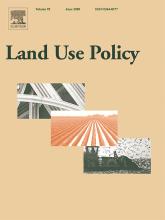Resource information
Sustainable land management is of utmost importance in Ethiopia and relies on Soil and Water Conservation (SWC) measures collectively implemented by smallholders through participatory processes. This paper contributes systematic evidence on how SWC strategies are implemented and how participation is operationalized. Drawing upon inductive, qualitative research, we explore the design, implementation and evaluation of SWC activities, as they relate to Ostrom’s Institutional Analysis and Development (IAD) framework, in order to determine how the activities can be made more appropriate, effective and sustainable. Findings show that on all levels of Ostrom’s framework, there are shortcomings in the SWC institutions, which have to be addressed with more participatory approaches, a change from top-down to bottom-up measures, and economic incentives for farmers to invest in SWC measures instead of e.g. compulsory labor, and the integration of so far neglected groups like youth, women and the landless.


